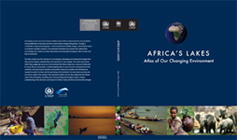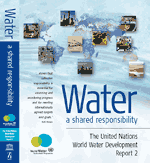|
 UNECA/UN-WATER
AFRICA: AFRICA WATER DEVELOPMENT REPORT:
The African Water Development Report (AWDR) is an in- depth
and African-owned report, which forms an integral component
of the World Water Development Report. The objectives of the
AWDR are to: provide a lasting and durable mechanism to
monitor progress made in implementing the African Water
Vision; provide African decision makers with an
authoritative basis for managing Africa’s water resources;
and serve as an integrative programme for the strengthening
of UN-Water/Africa.
More. UNECA/UN-WATER
AFRICA: AFRICA WATER DEVELOPMENT REPORT:
The African Water Development Report (AWDR) is an in- depth
and African-owned report, which forms an integral component
of the World Water Development Report. The objectives of the
AWDR are to: provide a lasting and durable mechanism to
monitor progress made in implementing the African Water
Vision; provide African decision makers with an
authoritative basis for managing Africa’s water resources;
and serve as an integrative programme for the strengthening
of UN-Water/Africa.
More.
 UNECA/UN-WATER
AFRICA: AFRICAN WATER VISION 2025:
The Africa Water Vision for
2025 is designed to avoid the disastrous consequences of
water-related threats and lead to a future where the full
potential of Africa’s water resources can be readily
unleashed to stimulate and sustain growth in the region’s
economic development and social well-being.
Full Text. UNECA/UN-WATER
AFRICA: AFRICAN WATER VISION 2025:
The Africa Water Vision for
2025 is designed to avoid the disastrous consequences of
water-related threats and lead to a future where the full
potential of Africa’s water resources can be readily
unleashed to stimulate and sustain growth in the region’s
economic development and social well-being.
Full Text.
 UNDP:
HUMAN DEVELOPMENT REPORT 2006: ‘BEYOND SCARCITY: POWER,
POVERTY AND THE GLOBAL WATER CRISIS’:
The Human Development Report 2006, launched on 9 November in
Cape Town, South Africa, is subtitled ‘Beyond Scarcity:
Power, Poverty and the Global Water Crisis’. The report
highlights that clean water and sanitation are amongst the
most powerful drivers for human development. Access to water
and sanitation extends opportunities, enhances dignity and
helps create a virtuous cycle of improving health and rising
wealth. The report highlights poverty, unequal access, wars,
migration and unsustainable consumption patterns as the main
contributors of the water crisis. It puts forward the
important message that we are in the midst of a crisis in
water and sanitation that overwhelmingly affects the poor. A
crisis, in which too many people do not have access to
enough water under the right conditions to live.
Human Development Report 2006. UNDP:
HUMAN DEVELOPMENT REPORT 2006: ‘BEYOND SCARCITY: POWER,
POVERTY AND THE GLOBAL WATER CRISIS’:
The Human Development Report 2006, launched on 9 November in
Cape Town, South Africa, is subtitled ‘Beyond Scarcity:
Power, Poverty and the Global Water Crisis’. The report
highlights that clean water and sanitation are amongst the
most powerful drivers for human development. Access to water
and sanitation extends opportunities, enhances dignity and
helps create a virtuous cycle of improving health and rising
wealth. The report highlights poverty, unequal access, wars,
migration and unsustainable consumption patterns as the main
contributors of the water crisis. It puts forward the
important message that we are in the midst of a crisis in
water and sanitation that overwhelmingly affects the poor. A
crisis, in which too many people do not have access to
enough water under the right conditions to live.
Human Development Report 2006.
UNEP: HARVESTING RAINFALL A KEY CLIMATE ADAPTATION
OPPORTUNITY FOR AFRICA:
The massive potential of rainwater harvesting in Africa was
underlined in a new report released during the Nairobi
Climate Summit in November 2006. The report, compiled by the
UN Environment Programme (UNEP) and the World Agroforestry
Center, concludes that many communities and countries
suffering or facing water shortages as a result of climate
change could dramatically boost water supplies by collecting
and storing rainwater. In the report, UNEP and the World
Agroforestry Centre, urged governments and donors to invest
more widely in a technology that is low cost, simple to
deploy and maintain, and able to transform the lives of
households, communities and countries Africa-wide.
 UNEP Press Release
UNEP Press Release
 Rain Water Harvesting
Rain Water Harvesting
 Potential for Rainwater Harvesting in Africa
Potential for Rainwater Harvesting in Africa
 Potential for Rain Water Harvesting in ten African Cities
Potential for Rain Water Harvesting in ten African Cities
 Maps of Rainwater Harvesting in Africa
Maps of Rainwater Harvesting in Africa
 UNEP:
ATLAS OF AFRICA ‘S LAKES:
Produced by the United Nations Environment Programme (UNEP),
the Africa's Lakes: Atlas of Our Changing Environment
compares and contrasts spectacular satellite images of the
past few decades with contemporary ones. These publications
"Africa's Lakes: Atlas of Our Changing Environment" and "Hydropolitical
Vulnerability and Resilience along International Waters
Africa" have been prepared under the auspices of the African
Ministerial Council on Water (AMCOW). UNEP:
ATLAS OF AFRICA ‘S LAKES:
Produced by the United Nations Environment Programme (UNEP),
the Africa's Lakes: Atlas of Our Changing Environment
compares and contrasts spectacular satellite images of the
past few decades with contemporary ones. These publications
"Africa's Lakes: Atlas of Our Changing Environment" and "Hydropolitical
Vulnerability and Resilience along International Waters
Africa" have been prepared under the auspices of the African
Ministerial Council on Water (AMCOW).
 UNEP Press Release
UNEP Press Release
 Atlas of Africa’s Lakes
Atlas of Africa’s Lakes
 2ND UNITED NATIONS WORLD WATER
DEVELOPMENT REPORT: 'WATER, A SHARED
RESPONSIBILITY:
The triennial UN World Water Development Report is a joint
undertaking of 24 UN agencies comprising UN-Water in
partnership with governments and other stakeholders, and
coordinated by WWAP. It presents a comprehensive picture of
freshwater resources in all regions and most countries of
the world as it tracks progress towards the water-related
targets of the UN Millennium Development Goals and examines
a range of key issues including population growth and
increasing urbanization, changing ecosystems, food
production, health, industry and energy, as well as risk
management, valuing and paying for water and increasing
knowledge and capacity. Sixteen case studies look at typical
water resource challenges and provide valuable insights into
different facets of the water crisis and management
responses. Finally, the report outlines a set of
conclusions and recommendations to guide future action and
encourage sustainable use, productivity and management of
our increasingly scarce freshwater resources. WWDR2 is aimed
at a wide audience, including all those interested or
directly involved in the formulation and implementation of
water-related policies, as well as managers, researchers,
teachers, students and, of course, water users themselves.
More. 2ND UNITED NATIONS WORLD WATER
DEVELOPMENT REPORT: 'WATER, A SHARED
RESPONSIBILITY:
The triennial UN World Water Development Report is a joint
undertaking of 24 UN agencies comprising UN-Water in
partnership with governments and other stakeholders, and
coordinated by WWAP. It presents a comprehensive picture of
freshwater resources in all regions and most countries of
the world as it tracks progress towards the water-related
targets of the UN Millennium Development Goals and examines
a range of key issues including population growth and
increasing urbanization, changing ecosystems, food
production, health, industry and energy, as well as risk
management, valuing and paying for water and increasing
knowledge and capacity. Sixteen case studies look at typical
water resource challenges and provide valuable insights into
different facets of the water crisis and management
responses. Finally, the report outlines a set of
conclusions and recommendations to guide future action and
encourage sustainable use, productivity and management of
our increasingly scarce freshwater resources. WWDR2 is aimed
at a wide audience, including all those interested or
directly involved in the formulation and implementation of
water-related policies, as well as managers, researchers,
teachers, students and, of course, water users themselves.
More.
 UNEP:
AFRICA ENVIRONMENT OUTLOOK 2:
At the eighth session of AMCEN in Abuja, Nigeria, from 3-6
April 2000, Ministers decided that UNEP should prepare an
Africa Environment Outlook (AEO) report to provide a
scientific assessment of the African environment and related
policies and management programmes. At its ninth session
held in Kampala, Uganda, from 1-5 July 2002, AMCEN
officially launched the first AEO report - the first
comprehensive integrated report on the African environment.
Ministers acknowledged AEO as a flagship publication and
adopted the AEO process as a monitoring and reporting tool
for sustainable environmental management and to provide a
framework for national and subregional integrated
environmental assessment and reporting. During the
twenty-second session of the UNEP Governing Council/Global
Ministerial Environment Forum, held in February 2003 in
Nairobi, Kenya, the AMCEN decision on the AEO process was
endorsed under decision GC 22/9, which recommended that UNEP
continue to support the process. The second AEO was launched
at the eleventh session of AMCEN in Brazzaville, Republic of
the Congo, in May 2006. The report entitled Our Environment,
Our Wealth profiles Africa’s environmental resources as an
asset for the region’s development. The report highlights
the opportunities presented by the natural resource base to
support development and the objectives of the AU and NEPAD.
The report also underscores the need for sustainable
livelihoods, and the importance of environmental initiatives
in supporting them. Participants were also shown a short
film on African environmental issues. UNEP:
AFRICA ENVIRONMENT OUTLOOK 2:
At the eighth session of AMCEN in Abuja, Nigeria, from 3-6
April 2000, Ministers decided that UNEP should prepare an
Africa Environment Outlook (AEO) report to provide a
scientific assessment of the African environment and related
policies and management programmes. At its ninth session
held in Kampala, Uganda, from 1-5 July 2002, AMCEN
officially launched the first AEO report - the first
comprehensive integrated report on the African environment.
Ministers acknowledged AEO as a flagship publication and
adopted the AEO process as a monitoring and reporting tool
for sustainable environmental management and to provide a
framework for national and subregional integrated
environmental assessment and reporting. During the
twenty-second session of the UNEP Governing Council/Global
Ministerial Environment Forum, held in February 2003 in
Nairobi, Kenya, the AMCEN decision on the AEO process was
endorsed under decision GC 22/9, which recommended that UNEP
continue to support the process. The second AEO was launched
at the eleventh session of AMCEN in Brazzaville, Republic of
the Congo, in May 2006. The report entitled Our Environment,
Our Wealth profiles Africa’s environmental resources as an
asset for the region’s development. The report highlights
the opportunities presented by the natural resource base to
support development and the objectives of the AU and NEPAD.
The report also underscores the need for sustainable
livelihoods, and the importance of environmental initiatives
in supporting them. Participants were also shown a short
film on African environmental issues.
 AEO reports
AEO reports
 AEO 2
AEO 2
 AEO 2 Water Chapter
AEO 2 Water Chapter

WORLD
BANK: AFRICA COUNTRY STATUS OVERVIEW REPORTS:
The MDG Country Status Reports
are the result of collaborative inputs by the African
Ministers’ Council on Water (AMCOW), the African Development
Bank, the European Union Water Initiative, the United
Nations Development Programme, the Water and Sanitation
Program-Africa, and the World Bank. What is distinctive
about these Country Status Overview reports is that the data
and summary assessments have been drawn from local data
sources, and, as much as possible, the assessments have been
subject to broad-based consultations with lead government
agencies and country sector stakeholders, including donor
institutions.
Full Report.
THE COMPREHENSIVE ASSESSMENT OF
WATER MANAGEMENT IN AGRICULTURE:
The Comprehensive Assessment of Water Management in
Agriculture critically evaluates the benefits, costs, and
impacts of the past 50 years of water development, the water
management challenges communities are facing today, and
solutions people have developed. The results will enable
better investment and management decisions in water and
agriculture in the near future and over the next 50 years.
The assessment is produced by a broad partnership of
practitioners, researchers and policy makers.
More. |

